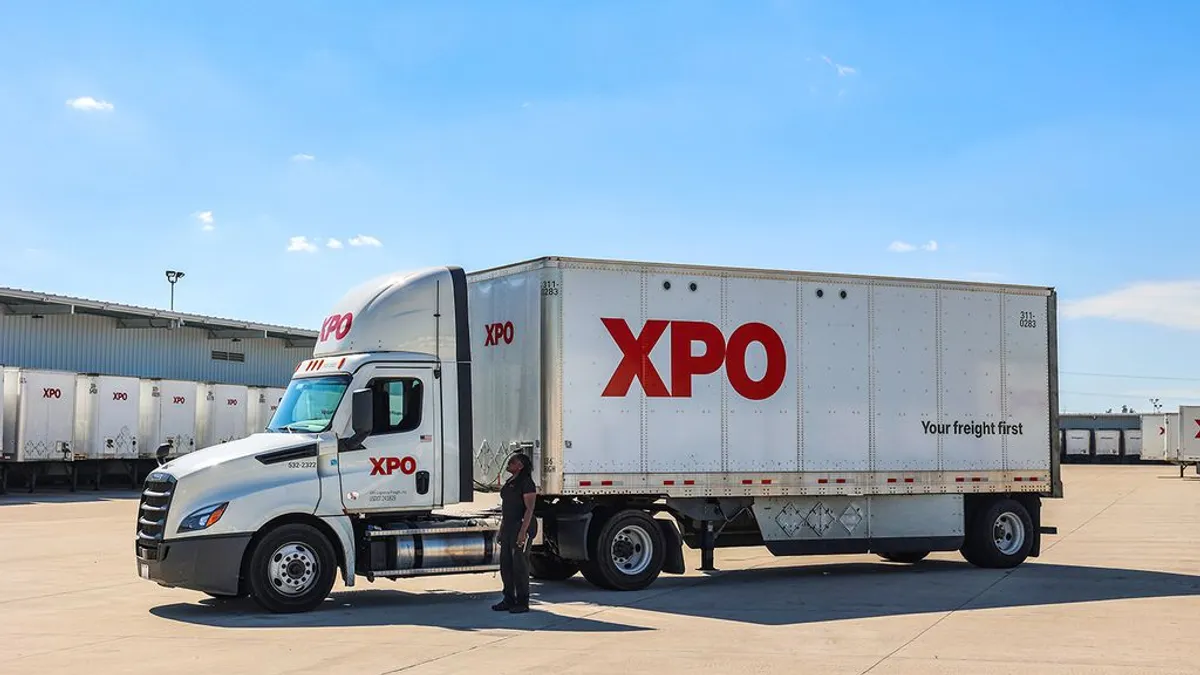Update: U.S. District Judge Roger Benitez issued a restraining order temporarily blocking enforcement of Assembly Bill 5 (AB5) for truck drivers Tuesday, Dec. 31. A hearing on a more permanent injunction is scheduled for Jan. 13, delaying the operational impacts feared by supply chains operating in the state. More details on the latest developments here.
On Jan. 1, California's Assembly Bill 5 (AB5) will take effect, sending contractor-dependent industries into varying states of limbo. The law ushers in a new test for what constitutes an independent contractor. To boil it down, any worker completing tasks core to the hiring company's business will be deemed an employee.
The new standard (called the ABC test) is intended to keep businesses from avoiding providing overtime pay and benefits to contract workers who work near full-time hours or make an equivalent contribution as a full-time employee. Unions, ride-sharing drivers and the AFL-CIO have hailed the legislation as a win for worker's rights.
But the implementation presents a major shift for supply chains in California that experts expect to affect trucking capacity and eventually rates.
Firms across industries from publishing to the gig economy and restaurants are getting ready to comply — some essentially firing all of their contractors in the state. And legal challenges are stacking up.
As of 2016, owner-operators, hired as contractors by carriers and shippers, made up 28% of the registered trucks in California, according to government numbers cited in a report conducted for the California Trucking Association (CTA) on the impacts of AB5. Many in the trucking industry are at a loss for how to comply with AB5, saying the state has not provided any guidance and suggesting the correct approach will ultimately be decided in court.

"This is about as clear as milk right now," Weston LaBar, the CEO of the Harbor Trucking Association, told Supply Chain Dive in an interview.
Some of this uncertainty may be the result of disbelief since the AB5 standard so drastically changes how employers and contractors function, said Megan Shaked, associate at law firm Conn Maciel Carey, which specializes in labor and employment.
"It's hard for some people to read it as black and white," she explained, adding the previous contractor standard had ample wiggle room. AB5 presents massive change and little wiggle room.
"I guess people may read it and say, 'No, No, that can't possibly be right,'" Shaked told Supply Chain Dive.
Queries to the state government for guidance have been unsuccessful, Norita Taylor, a spokesperson for the Owner–Operator Independent Drivers Association, told Supply Chain Dive in an email.
"This is about as clear as milk right now."

Weston LaBar
CEO, Harbor Trucking Association
As the law takes effect, it doesn't seem the state considered its potential impact on the freight market. There is no publicly available evidence that the bill's authors considered the freight ramifications during the legislative process. There are multiple analyses of AB5 on the state legislature website, but none of them mention freight capacity.
Four California state agencies — California Department of Transportation, the Employment Development Department, the Governor's Office of Business and Economic Development and the California Department of Industrial Relations — confirmed to Supply Chain Dive they did not study the impact the law would have on freight capacity.
One potential path toward further clarification for carriers wondering how to comply is a lawsuit filed by the CTA, asking for an injunction seeking to preserve the status quo until the suit works its way through court. A hearing on the injunction is scheduled for the morning of Dec. 30.
To comply or not to comply
Figuring out the best way to comply with AB5 without formal government guidance in an industry where contracting has been the standard operating procedure for decades isn't easy. The legal minds in California's transportation economy suggest five paths with differing degrees of legal certainty.
1. Convert to an all-employee fleet
The only "bulletproof" strategy, suggested Joe Rajkovacz, the director of Governmental Affairs and Communications for the Western States Trucking Association, is to make drivers full employees. Other legal experts agreed with this assessment.
Many stakeholders are avoiding this option for now, though, as they're hopeful AB5 will be preempted by federal law, which would allow them to continue operations with their current staffing structure.
This approach has other drawbacks for trucking companies. Full employment is more costly due to coincident expenses like workers comp — a benefit that has come up in numerous lawsuits against carriers where contractors were seeking to be classified as employees. And higher cost per driver for carriers means higher rates for shippers.
Few in the industry are taking the full employment approach, said LaBar. The other possibilities, while perhaps more likely, offer less clarity in terms of legality. Without further guidance or new legislation, the test of them will come, said several legal experts, as AB5 cases end up in court.
2. Convert to co-employment or leased employment model
In this scenario, a third party would employ the driver and handle Human Resources tasks like payroll and employment. The driver would still be a full employee, but not of the trucking company.
Hiring through staffing agencies is a similar solution, though Shaked advised carefully considering this option since "joint-employer rules" can shift liability for these employees.
"It's certainly a good time to really carefully review any consulting agreements or independent contractor agreements that you may be using," said Shaked.
3. Seek out the business-to-business exemption
One of the exemptions written into AB5 allows for contract work between two businesses. To make this work, it would require changes by the carrier and the driver.
The carrier would have to stand up a brokerage division separate from its trucking business. Meanwhile, the driver would have to change status from sole proprietor to S Corporation. The theory is, since a broker is not asset-based, a driver would pass the test and be deemed a contractor.
"The reason we're cautious about that is that we are well aware that California [Employment Development Department (EDD)] has audited broker members of ours and issued determinations that the subhaulers/owner operators are employees of the broker, so we have seen that behavior from EDD here in California," Rajkovacz said.
This change would require the driver to have his or her own insurance and permits and would operate as an independent small business. The model theoretically provides drivers the ability to drive for multiple companies, but they would now be a company that similarly has to comply with state and federal laws too, LaBar said.
"'Can we just get around AB5 if we have every contractor create an LLC?' I get that all the time. And the answer is, it's probably not enough by itself," James Fessenden, employment partner at Fisher & Phillips, told Supply Chain Dive.
4. Move out of state
Some of the larger trucking operations are asking contractors to move to the closest headquarters outside of California. But these companies could still find they're breaking AB5 if they send drivers over the state line back into California to do work, LaBar said.
5. Do nothing
Some trucking companies are doing nothing until they hear the result of the injunction and will then implement a plan, LaBar said. Still others argue it is preempted by federal law and plan to do nothing — ready to fight it in court.
None of the legal experts Supply Chain Dive consulted recommended this option, mainly because misclassification cases in California carried unique financial risk even before AB5.
"California has what I call cascading penalties. Meaning that if you violate the labor code in one area, you usually trigger two, three, maybe even four different kinds of penalties,” said Fessenden. A $5 wage discrepancy could trigger thousands of dollars in fines owed by the employer in some circumstances, he explained. Multiply that by hundreds of workers and the risk of noncompliance becomes much more dramatic than simply paying unpaid wages.
"California bears the burden of [AB5] in terms of the capacity shortage it's going to create and the prices it's going to inflate."

Keith McCoy
Director of Marketing, Prime
Adding further complication, AB5 has some retroactivity baked in that can go back as far as four years, depending on the specific penalty, said Fessenden adding, "California is making it so expensive and so risky to operate a business in the state."
Impact on capacity
Come AB5 enforcement in January, the effect on trucking capacity and rates in California (and beyond?) for shippers is a serious worry for stakeholders. Morgan Stanley listed AB5 as a headwind for the freight industry that could create "supply-side constraints," driving prices higher. A similar situation is brewing in New Jersey where the state legislature is considering Senate Bill 4204, which would institute a version of California's ABC test.
A report prepared for CTA by John E. Husing, the chief analyst at Economics & Politics, Inc., which appears as an exhibit in CTA's recent request for an injunction, suggests trucking companies would struggle with the new financial obligations that result from the legislation.
"The result would be to inhibit national freight movements by limiting the trucking services provided to the nation from a key manufacturing, agricultural and trading state," the report reads. Husing suggested AB5 will result in higher prices for freight moving around the state.
"California bears the burden of [AB5] in terms of the capacity shortage it's going to create and the prices it's going to inflate," Keith McCoy, the director of marketing at Prime, a Missouri-based trucking company, told Supply Chain Dive last month.
LaBar suggested impact on capacity likely won't be immediate, but it could change the state's freight landscape in the years to come depending on how the pending court case plays out.
"It's beyond complicated," Rajkovacz said. "They're screwing with people's livelihoods."
It's these seemingly unstudied consequences that have some legal minds expecting swift legislative action in January.
Without specific knowledge of goings-on in Sacramento, Shaked said, "There have been indications that a follow-up bill — I don't know if I would call it a cleanup bill because I don't know if it's going to clarify things or simply expand on them — but I would expect this is not the last we're going to be hearing as of AB5."





















